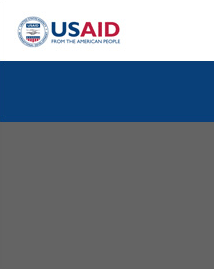USAID ADVANCING YOUTH PROJECT ![]() (pdf - 298k)
(pdf - 298k)
The USAID Advancing Youth Project provides increased access to quality alternative basic education services, social and leadership development, and livelihood training for Liberian youth and young adults (aged 13–35), who are out of school, and who lack or have marginal literacy and numeracy skills. The project works closely with the Ministry of Education and community-based organizations to deliver training and tools for managing programs designed to provide youth with the knowledge and skills they need to succeed.
During the hiatus in classes due to Ebola, the Advancing Youth Project offered distance learning opportunities to youth enrolled in alternative basic education, and helped youth clubs continue farming by offering material and technical support.
Current Activities
- Develop and train facilitators to deliver three levels of alternative basic education curriculum.
- Organize youth clubs and local alliances to support youth education and enhanced livelihoods.
- Develop private industry to help improve staff capabilities and to place learners into professional internships.
- Develop public-private partnerships with Liberian and international businesses so youth can find practical, work-based learning, skills training, entrepreneurship, and employment opportunities.
- Provide donated tools and seeds to youth clubs to promote food security and alternate sources of income.
Accomplishments To Date
- Enrolled over 16,800 learners (69% women) in 150 sites.
- Delivered basic skills training—in topics such as food preservation, snail rearing, and basket weaving— to almost 2,500 youth to improve livelihoods.
- Procured and distributed nearly 150,000 learning materials.
- Established youth clubs with elected officers, (74% are women).
- Finalized three levels of alternative basic education curricula including science, social studies, literacy, numeracy, life skills, work readiness, and agro-enterprise skills.
- Trained nearly 1,200 facilitators and administrators on delivering alternative basic education instruction.
- Broadcast Interactive Audio Instruction programs for learners to review lessons while schools were closed due to Ebola.
- Launched a series of 200 Interactive Audio Instruction programs to all Level 1 classes after a successful pilot showed significant increases in literacy scores.
- Successfully piloted MLearning with SMS texts to support Level 3 learning.
- Implementing the use of a Mobile Money service to pay stipends to faciliators and administrators.
- Provided information about family planning and HIV/AIDS as well as voluntary testing & counseling services to 106 sites.
Planned Outcomes
- Quality standards for alternative basic education will be tested and finalized.
- Liberian NGOs will implement alternative basic education programs, expanding the reach of the project and building local capacity.
- Learner achievement will be enhanced through the use of appropriate information and communication technologies, such as Interactive Audio Instruction and mobile learning through the use of cell phones.
- Learners wil have expanded livelihood opportunities as a result of skills training, internships, and Village Savings and Loan associations.
- Learners will have access to leadership and small business development opportunities through youth clubs and enterprise groups.
- Administrators and facilitators will receive regular in-service training for alternative basic education at the site level.
- Best practices will be documented, discussed, and disseminated through a Learning Agenda.








Comment
Make a general inquiry or suggest an improvement.